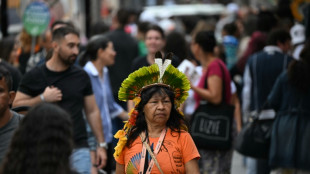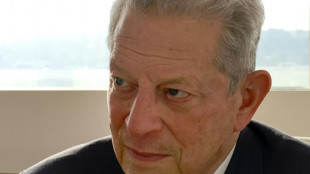
-
 Ronaldo shines as Portugal rout Poland to reach Nations League last-eight
Ronaldo shines as Portugal rout Poland to reach Nations League last-eight
-
Spain beat Denmark to seal Nations League group win

-
 Former AFCON champions Ghana bow out as minnows Comoros qualify
Former AFCON champions Ghana bow out as minnows Comoros qualify
-
Poland, Britain reach BJK Cup quarter-finals

-
 At summit under Trump shadow, Xi and Biden signal turbulence ahead
At summit under Trump shadow, Xi and Biden signal turbulence ahead
-
Lebanon said studying US truce plan for Israel-Hezbollah war

-
 Xi warns against 'protectionism' at APEC summit under Trump cloud
Xi warns against 'protectionism' at APEC summit under Trump cloud
-
Nigerian UN nurse escapes jihadist kidnappers after six years

-
 India in record six-hitting spree to rout South Africa
India in record six-hitting spree to rout South Africa
-
George tells England to prepare for rugby 'war' against Springboks

-
 Pogba's Juve contract terminated despite doping ban reduction
Pogba's Juve contract terminated despite doping ban reduction
-
Ukraine slams Scholz after first call with Putin in two years

-
 Michael Johnson's Grand Slam Track series to have LA final
Michael Johnson's Grand Slam Track series to have LA final
-
Kagiyama, Yoshida put Japan on top at Finland Grand Prix

-
 Alcaraz eyeing triumphant Davis Cup farewell for Nadal after ATP Finals exit
Alcaraz eyeing triumphant Davis Cup farewell for Nadal after ATP Finals exit
-
Xi, Biden at Asia-Pacific summit under Trump trade war cloud

-
 India go on record six-hitting spree against South Africa
India go on record six-hitting spree against South Africa
-
France skipper Dupont says All Blacks 'back to their best'

-
 Trump pressures US Senate with divisive cabinet picks
Trump pressures US Senate with divisive cabinet picks
-
Bagnaia strikes late in Barcelona practice to edge title rival Martin

-
 High-ball hero Steward ready to 'front up' against South Africa
High-ball hero Steward ready to 'front up' against South Africa
-
Leader of Spain flood region admits 'mistakes'

-
 Swiatek, Linette take Poland past Spain into BJK Cup quarter-finals
Swiatek, Linette take Poland past Spain into BJK Cup quarter-finals
-
Leftist voices seek to be heard at Rio's G20 summit

-
 Wales coach Jenkins urges players to 'get back on the horse'
Wales coach Jenkins urges players to 'get back on the horse'
-
Zverev reaches ATP Finals last four, Alcaraz out

-
 Boeing strike will hurt Ethiopian Airlines growth: CEO
Boeing strike will hurt Ethiopian Airlines growth: CEO
-
Springboks skipper Kolisi wary of England's 'gifted' Smith

-
 End of a love affair: news media quit X over 'disinformation'
End of a love affair: news media quit X over 'disinformation'
-
US finalizes up to $6.6 bn funding for chip giant TSMC

-
 Scholz urges Ukraine talks in first call with Putin since 2022
Scholz urges Ukraine talks in first call with Putin since 2022
-
Zverev reaches ATP Finals last four, Alcaraz on brink of exit

-
 Lebanon rescuer picks up 'pieces' of father after Israel strike
Lebanon rescuer picks up 'pieces' of father after Israel strike
-
US retail sales lose steam in October after hurricanes

-
 Zverev reaches ATP Finals last four with set win against Alcaraz
Zverev reaches ATP Finals last four with set win against Alcaraz
-
Kerevi back for Australia against Wales, Suaalii on bench

-
 Spate of child poisoning deaths sparks S.Africa xenophobia
Spate of child poisoning deaths sparks S.Africa xenophobia
-
Comedian Conan O'Brien to host Oscars

-
 Rozner overtakes McIlroy and Hatton for Dubai lead
Rozner overtakes McIlroy and Hatton for Dubai lead
-
Mourners bid farewell to medic killed in east Ukraine

-
 Gore says 'absurd' to hold UN climate talks in petrostates
Gore says 'absurd' to hold UN climate talks in petrostates
-
Hamas says 'ready for ceasefire' as Israel presses Gaza campaign

-
 Amorim says Man Utd is 'where I'm supposed to be'
Amorim says Man Utd is 'where I'm supposed to be'
-
Japan hammer Indonesia to edge closer to World Cup spot

-
 Jeff Beck guitar collection to go under the hammer in January
Jeff Beck guitar collection to go under the hammer in January
-
Veteran Ranieri has 'no time for mistakes' on Roma return

-
 Van Nistelrooy says he will 'cherish' Man Utd memories in farewell message
Van Nistelrooy says he will 'cherish' Man Utd memories in farewell message
-
IAEA chief tours sensitive Iran nuclear plants

-
 Pompeii rejects 'mass tourism' with daily visitor limit
Pompeii rejects 'mass tourism' with daily visitor limit
-
Jailed Russian poet could be 'killed' in prison, warns wife


Anti-dopers wrestle with paying informants to break sports' code of silence
Anti-doping organisations are torn over a suggestion from the director general of the International Cycling Union (ICU) to pay sports insiders to inform on their rivals or colleagues.
"We need information from the peloton. We need Radio Peloton," Amina Lanaya told a French newspaper earlier this year.
To fight what she called "a form of omerta" in her sport she said the UCI needed to "infiltrate the peloton, infiltrate certain teams, pay for 'grasses'."
Paid criminal informants are a staple of police work in many countries, but Lanaya's suggestion that sport adopts the same approach has led to debate in the anti-doping community, even as they acknowledge that some of the biggest cases in recent years were broken thanks to tip-offs.
One of the biggest scandals in history, the vast system of institutionalised doping in Russia, gained world-wide attention in 2014 when German broadcaster ARD released a series of documentaries based on information from Vitaly Stepanov, a former an employee of Russia's anti-doing agency RUSADA, and his wife, runner Yulia Stepanova.
"It is essential to have informants," said Damien Ressiot, head of the investigation department at the French anti-doping agency (AFLD), who pointed out that of the 11 violations of anti-doping rules, only one involved testing.
"And on the other ten, we only get them by investigating," he explains.
Those categories include the athlete's whereabouts failures, tampering with samples, possession as well as threats or retaliation against informants.
Yet Ressiot is not convinced that paying informants will work.
"I don't see the point," he says.
Guenter Younger, a former German policeman and Interpol officer who is the head of the investigations at the World Anti-Doping Agency (WADA), agreed.
"I'm not a big fan, to be honest," he told AFP.
- 'None asked to be paid' -
While Younger said some informants are driven by idealism and a desire "for clean sport", Ressiot added "but also sometimes by envy, or for other reasons."
The AFLD and WADA have both created dedicated tip web sites.
"We have a lot of information through this channel," said Ressiot, adding that the AFLD received 80 reports in 2021 on its site.
Younger says that WADA's five-year-old 'Speak Up!' web page has also been highly productive.
He said "none of the informants over the past five years has asked to be paid".
WADA can offer financial aid for "substantial assistance" by informants but, said Younger, these are used more as an expense allowance "for whistleblowers, if they have to travel to a place for example."
The aid is also used to protect and escort athletes caught doping who decide to collaborate.
"This has already happened in the past," says Ressiot.
But, he says, the AFLD has never taken on paid informants.
Younger says handing over cash for tips raises practical questions.
"It would be a problem for me to pay for something without knowing what it will be," he said.
"I would probably ask for the information before knowing if I should pay for it, I would evaluate it and then I would ask for the price."
Other observers support Lanaya.
"There is a very strong omerta in the sports world. Anything that can break it is a good thing," said Pim Verschuuren, who works on sports governance at the French Institut de Relations Internationales et Strategiques
But, he warns, "by creating informants, we will place athletes in risky situations, they will be exposed and perhaps in danger. It must be minimal."
A.Gasser--BTB
